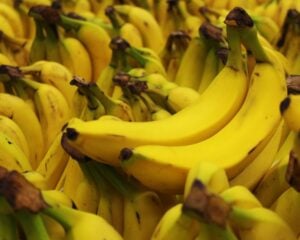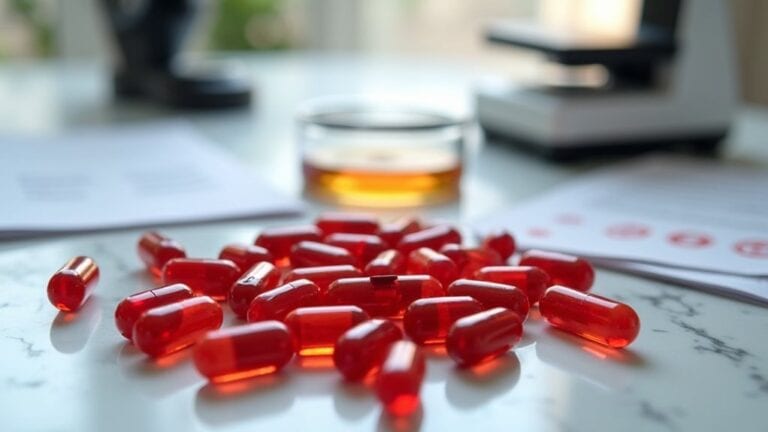Bananas are more than just a tasty snack; they’re packed with potassium, about 422mg per medium fruit. This mineral is key to overall health, affecting everything from blood pressure to muscle function. Knowing the potassium content in bananas will help you appreciate them even more. With a balance of vitamins and fiber, bananas are a versatile addition to many meals. What else do bananas have to offer? Let’s dive into their nutritional profile.
Potassium in Bananas
When thinking about the nutritional wonders of fruits, bananas stand out, not just for convenience but also for their potassium content. A medium banana, about 118g, has around 422mg of potassium which is about 9% of the daily intake for optimal health.
This mineral is key to regulating blood pressure and muscle and nerve function. Note that the potassium content in ripe and unripe bananas is the same, so both can be part of your diet. Plus the high fiber content in bananas is good for digestive health, making them a digestive health powerhouse.
For comparison, a banana has the same amount of potassium as a small baked potato or a cup of cooked spinach, so it’s a easy way to boost your potassium intake.
Health Benefits of Potassium
Potassium has many health benefits that go beyond its presence in bananas. This essential mineral is key to regulating blood pressure by balancing sodium, great for heart health. Research shows that adequate potassium intake can reduce stroke risk by 24% and improve cardiovascular health by ensuring proper heartbeat and muscle contractions.
Also potassium is good for bone density as it minimizes calcium loss, promoting better bone mineral density. It also supports kidney function by reducing the risk of stone formation.
Plus potassium rich foods like bananas can alleviate muscle cramps by maintaining electrolyte balance during physical activity, ensuring ideal muscle performance and reducing discomfort during exercise. Including potassium rich foods like nuts in your diet can further boost your heart health and overall well being.
Banana Nutritional Profile
A banana’s nutritional profile is a powerhouse of benefits in its creamy sweet flesh. 105 calories, a medium banana has 26.9g of carbohydrates, 14.4g of natural sugars and 3.07g of fiber.It’s also a good source of potassium, 422mg to be exact which is good for heart health. The vitamin B6 (0.433mg) and vitamin C (10.3mg) content is a bonus.
Ripe bananas have a glycemic index of 42-51 due to their resistant starch and pectin which slows down sugar release. This combination of nutrients makes bananas not only tasty but also very beneficial for daily needs. Plus potassium bioavailability increases as bananas ripen so fully yellow bananas is the best way to maximize potassium intake.
Other Nutrients in Bananas
How much goodness can one fruit have? Bananas are not just a potassium powerhouse; they also have other essential nutrients.
10.3mg of vitamin C per medium banana strengthens immune function and collagen production.
0.433mg of vitamin B6 for metabolism and neurotransmitter synthesis.
32mg of magnesium for muscle and nerve function and 1.29g of protein including tryptophan for mood regulation.
Small amounts of calcium and iron—6mg and 0.31mg respectively—for bone and blood health.
Such a combination of nutrients makes bananas a great overall wellness food.
Tips for Incorporating Bananas Into Your Diet
While it’s easy to overlook simple fruits in meal planning, bananas offer pleasant versatility that can improve any diet. Adding bananas is straightforward; they effortlessly boost meals with potassium and nutrients.
| Use | Benefit |
|---|---|
| Breakfast | Add sliced bananas to oatmeal or yogurt for a potassium-rich start. |
| Snack | Pair banana slices with nut butter for a healthy treat combining potassium and fats. |
| Smoothies | Blend frozen bananas for natural sweetness and fiber. |
| Baking | Use mashed bananas as a butter substitute to reduce added sugar. |
| Dessert | Freeze banana halves dipped in yogurt for a vitamin B6-rich delight. |
With these strategies, bananas become a powerhouse element in daily nutrition, ensuring a colorful and nourishing approach to eating.
References:
- Quan, Z., Li, C., Zhao, L., Cui, D., Liu, S., Yin, Y., … Fu, X. (2024). Effect of banana intake on serum potassium level in patients undergoing maintenance hemodialysis: A randomized controlled trial. International Journal of Nursing Sciences, 11(2), 197–204. https://doi.org/10.1016/j.ijnss.2024.03.016
- Uma, S., Sathiamoorthy, S., & Mustaffa, M. M. (2011). Bananas and plantains (Musa spp.): Botany, production, composition and uses. Critical Reviews in Food Science and Nutrition, 51(6), 533–552. https://doi.org/10.1080/10408398.2011.552748
- https://www.sciencedirect.com/science/article/abs/pii/S0308814605010360





